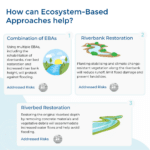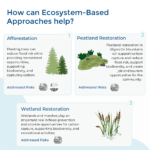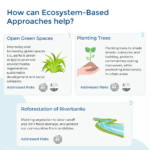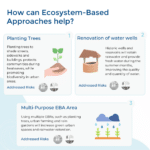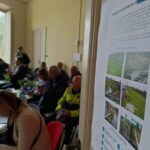SCORE has facilitated multiple criteria analysis workshops in all its Coastal City Living Labs to assess Ecosystem-based adaptation solutions.
Climate change adaptation solutions vary – from hard engineering solutions, such as dikes and embankments, to ecosystem-based adaptation (EBAs), such as retention ponds and rainwater gardens, or a combination of these. Through the years, interest in EBAs, also considered as nature-based solutions, has been increasing as this focus on the sustainable management, conservation, and restoration of ecosystems to provide services that support climate change adaptation apart from providing other social, economic, and environmental benefits.
Infographics presenting the EBAs selected by our CCLLs
- Oarsoaldea
- Vilanova i la Geltru
- Sligo
- Piran
Addressing climate change adaptation with EBA
Within the SCORE project, EBAs are the main focus for addressing climate change adaptation and enhancing long term resilience. Considering different geographical contexts, including localised climate-related hazards and risks, a unique set of EBAs have been selected for each of the ten Coastal City Living Labs (CCLL) that are part of SCORE. Explore the SCORE EBA catalogue which shows multiple measures grouped in six categories – from urban green and permeable surfaces to river flood plains and wetlands, among others.
Multiple criteria analysis workshops in the CCLLs
In all the CCLLs, a participatory assessment approach via multiple criteria analysis (MCA) has been adopted to facilitate decision-making in the CCLLs. MCA integrates multiple criteria to assess EBA solutions individually and provides a comprehensive democratic approach of ranking options. The MCA approach has been adapted to integrate different criteria: environmental (e.g., biodiversity conservation), social (e.g., recreation opportunities), and economic (e.g., employment generation values).
To undertake the MCA activities and more, a total of 10 workshops have been completed across the SCORE CCLLs (in Spain, Portugal Italy, Ireland, Poland, Slovenia, and Turkey) between February and December 2023. These workshops, which covered online and/or face-to-face sessions, involved the participation of more than 150 stakeholders in the assessment of around 60 EBA solutions to address a wide range of climate-related challenges such as flooding (coastal and/or inland), coastal erosion, storm surge, droughts, or heatwaves.
Through MCA, local and regional stakeholders, ranging from citizen groups, public authorities, industry, and research/academia, in each CCLL were brought together to discuss their perspectives about EBA solutions. Although the results are not to be considered as binding, the process could enhance co-creation among CCLL stakeholders, providing important information to feed the decision-making and policy-making process in each CCLL.
- Samsun
- Massa
- Benidorm
What is next for the CCLLs?
During the workshops, the different CCLL teams have also discussed designing a plan for communicating and disseminating the results; further engaging with stakeholders for their planned activities; and brainstorming about their long-term operational sustainability. The Samsun CCLL in Turkey, for example, is now working with a newly established living lab in Sinop, the second in the Black Sea region, to enhance collaboration and exchange to foster climate change action.
Stay tuned for more information about the SCORE CCLLs!

